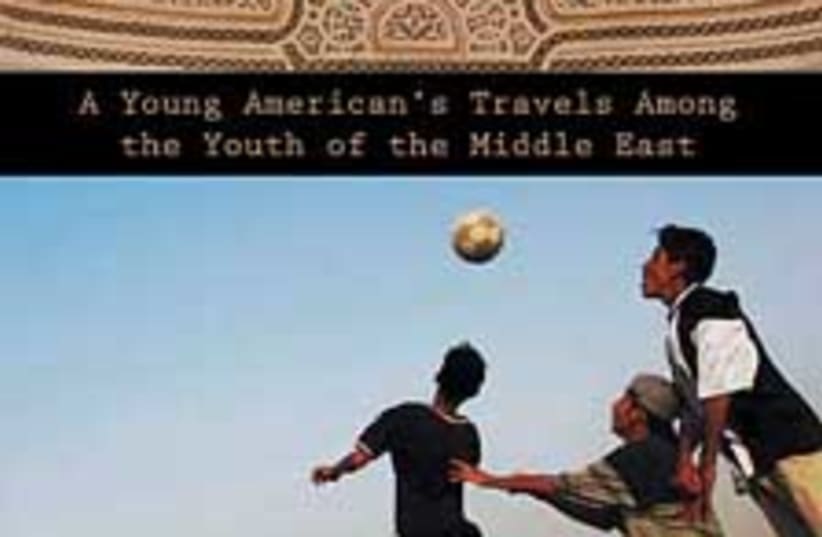Excerpt: A Cohen in Arabia
An American Jew ventures into hostile territory to learn more about Middle Eastern youth.
Children of Jihad
By Jared Cohen
Gotham
288 pages; $25
I was a little more anxious than usual on this particular Wednesday. How the hell do you tell Hezbollah - days before you're set to travel to their stronghold - that you are Jewish? I imagined every scenario possible. Few of these had a positive outcome. Images of violent confrontation horrified me. The last thing I wanted was to come back to my apartment to a frightening surprise.
Before they even had a chance to put the trays of food on the table, I blurted out, "There is something I need to tell all of you before we go to Dahiye," which was the location of the Hezbollah stronghold.
"No problem, what is it?" answered Fouad, who had paid for my lunch three weeks in a row. He was the leader of the group and usually dressed in dark blue jeans and a green collared shirt. We had actually met at a café in West Beirut three days after I arrived in Lebanon when I interrupted him and his friends teasing a group of their female friends. His hair was dark and curly and smothered with hair gel. He was scruffy and he always had a smile on his face.
I decided to just say it. After taking a deep breath, I exclaimed: "My last name is Cohen."
They stared at me blankly.
Were they confused? Shocked? Angry? These awkward silences were always so uncomfortable and being the chatterbox that I am, I usually felt compelled to fill the silence. This time I did so with a collection of stuttering points, "I am Jewish, my family is Jewish, and while I am not extremely religious, I do practice Judaism."
Still nothing.
"I know that - " I started.
"This is not a problem," Asharaf interrupted, placing his hand on my shoulder. He was Fouad's friend, short and stocky, and hardly the picture of a terrorist. This was not lost on his friends, who always seemed to pick on him a bit. "We have no problems with Jewish people. We have no problems with American people. We hate the United States government and we hate Israel, but the Jewish and the American people have done nothing to us."
Sharif, another of the young men, chimed in as well. He seemed to be the most slick of the group. Like Fouad's, his hair was drenched in gel, but it wasn't an explosion of curls as much as a stiff slicked-back style. He wore a sleeveless shirt, perhaps to prove that he ventured to the gym every now and then. What he said surprised me the most: "You know, we have never known any Jews before, but we have Christian friends. We even have three Christian deputies in Parliament elected from the south as members of the Hezbollah Party. If there were Jews in Lebanon we would probably be friends with them. We know the difference between religion, people, and their governments. In fact, we love American movies and music and we really like Americans. But we want to see the United States government destroyed."
Had Hezbollah just told me that they didn't care that I was American and Jewish? Had they also said that if there were Jews in Lebanon they would probably be friends with them? I had thought membership in Hezbollah mandated a strict adherence to the Shi'a interpretation of Islamic law, which would seem to preclude all of the above possibilities. I was shocked.
I was constantly surprised by my encounters with Middle Eastern youth, as much in Lebanon as in Iran, Iraq, and Syria. My impressions of the Middle East were largely shaped and colored by the mutually antagonistic relationship between the older generations of America and of Middle Eastern countries. I learned from my travels throughout the Middle East, however, that the youth can only be understood as their own phenomenon. They are far more tolerant than older generations and seemingly more sophisticated in their ability to distinguish between people, governments, and cultures.
Technology and unprecedented access to the outside world have given these young people sources of entertainment and means for communication that their parents never enjoyed. They embrace connectivity that transcends politics, religion, and extremism. The young men of Hezbollah were a perfect example. One minute they uttered extremist rhetoric about the American and Israeli governments, the next they went to nightclubs and danced to American music, watched American movies, and talked favorably about the concept of "America," a land as positively mythic for them as for generations of chasers of the American dream.
Technology widened the generational gap, affording these youth the opportunity to communicate in new and liberating ways. I found youth of every political persuasion in the Middle East living multiple lives, separating their social and recreational activities from their ideological enterprises.
if(catID != 151){
var cont = `Take Israel home with the new
Jerusalem Post Store
Shop now >>
`;
document.getElementById("linkPremium").innerHTML = cont;
var divWithLink = document.getElementById("premium-link");
if(divWithLink !== null && divWithLink !== 'undefined')
{
divWithLink.style.border = "solid 1px #cb0f3e";
divWithLink.style.textAlign = "center";
divWithLink.style.marginBottom = "40px";
divWithLink.style.marginTop = "40px";
divWithLink.style.width = "728px";
divWithLink.style.backgroundColor = "#3c4860";
divWithLink.style.color = "#ffffff";
}
}
(function (v, i){
});

